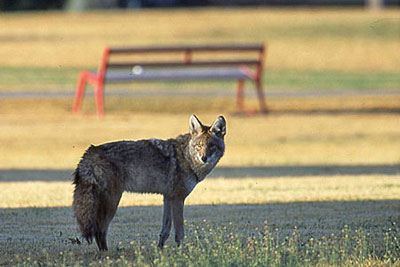
Wildlife Services has a long and bloody history of exterminating predators like coyotes and wolves, as well as killing other wildlife for economic or public health reasons.
The agency has always been a source of controversy, the most recent of which arose from a series of articles by Tom Knudson of the Sacramento Bee. His expose revealed an alarming set of brutal practices and cowboy culture in the agency, bespeaking an organization out of touch with the ethics or science of managing human-wildlife interactions. His articles raised such concern that they have sparked a forthcoming Congressional investigation.
The most recent development in this story has been the outrage of citizens in the town of Davis, CA over the gratuitous killing of five coyotes (four of them pups) at the request of a local golf course. After withering public criticism, the town severed its relationship with Wildlife Services.
The response from Wildlife Services has been to hunker down, comment as little as possible, and hope the controversy will go away. Such a response is neither useful or acceptable for a government agency, one that has both moral and political responsibilities to the public and wildlife.
In Wildlife Services Needs Ethical Review I suggest that Wildlife Services take a different tact, and revisit their general environmental impact statement (which serves as their strategic plan), with an eye to its ethics. This would require working ethics into the mission of the organization, ethics training for its staff, and a set of best practices that would include non-lethal measures whenever appropriate. As part of this process, they should also reach out and dialogue with the full range of concerned animal and environmental organizations. This would go a long way to rebuilding public trust in the agency.
I also hope that the town of Davis will follow the example of Marin, CA. Marin cancelled its contract with Wildlife Services many years ago, and then established a coyote co-existence plan developed by Camilla Fox and her organization, Project Coyote. This Marin model emphasizes non-lethal methods of managing coyotes whenever possible, and does a far better job at eliminating or mitigating conflicts than lethal control alone. The Marin model is thus a win-win for people, animals and nature in terms of both ethics and science. Project Coyote has introduced this model into the national dialogue on wildlife management, and engage in education, advocacy and consulting with an eye to teaching others communities how to live well with predators.
To learn more about what Project Coyote can do for your community, visit http://www.projectcoyote.org.
Image: Coyote Near Park Bench, Project Coyote website.